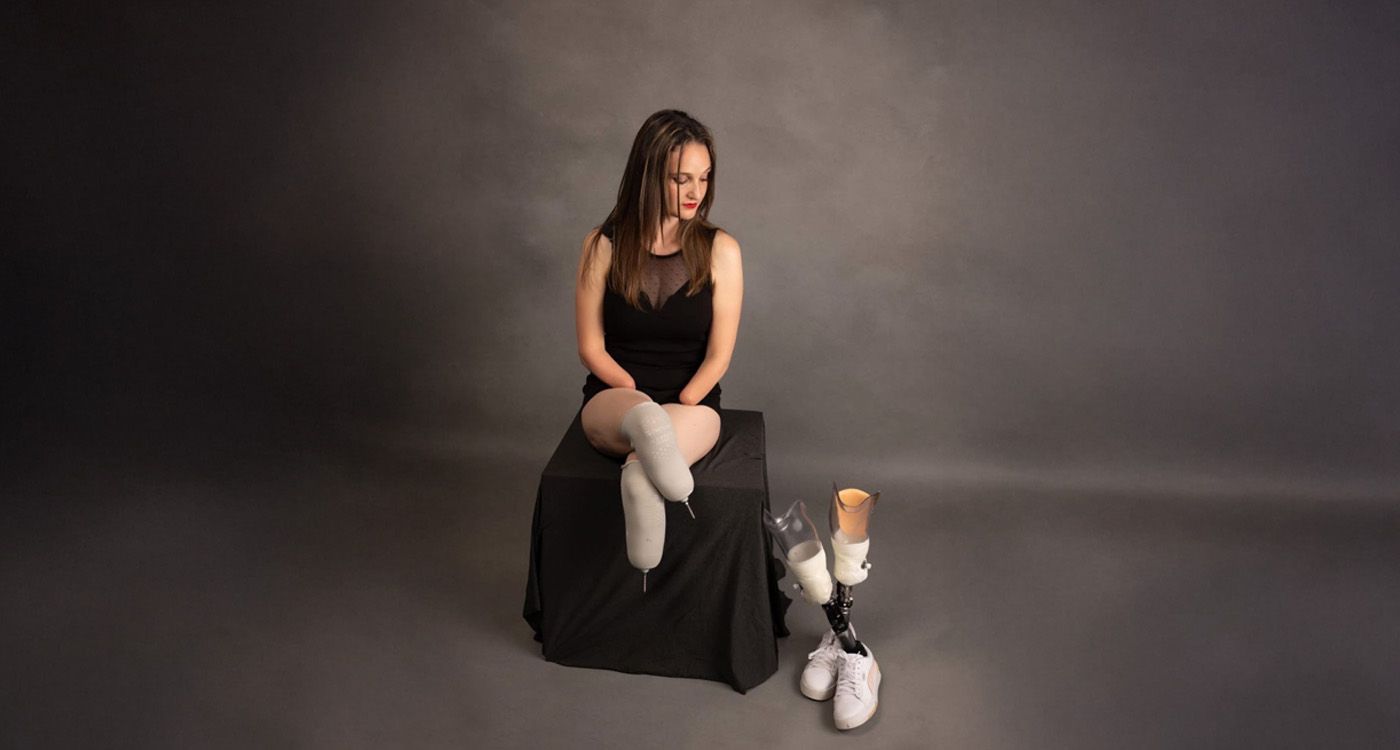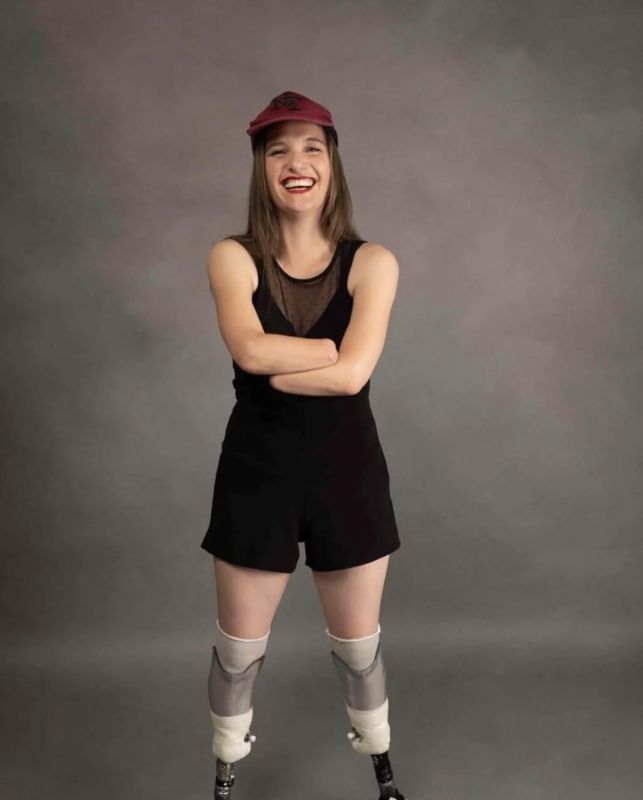
After a devastating case of malaria left her a quadruple amputee, Lucie Retail has reinvented her life. A moving speech at the Paralympic Games, single motherhood, rediscovered desire, radiant projects... and soon, the ascent of Mount Fuji, on July 3 and 4. The woman who turned disability into a force for living and being sat down for an interview with This is Beirut. The conversation was long, rich – there was so much to say. But among all her gems, we had to choose just a few.
“Can’t dance standing up? Dance on your knees.” When Lucie Retail utters these words on the Paralympic stage, a hush falls over the audience – followed by a thunder of emotional and admiring applause. There is nothing pitiful or theatrical in her statement. It is raw, direct. It tells the truth of an amputated body that still stands. It tells the truth of a life forever changed – and yet embraced with grace.
Two years earlier, Lucie was struck by sudden, severe malaria. Her body pulled through – but at a huge cost: the amputation of all four limbs. A complete upheaval. “Disability used to scare me sometimes,” she says candidly. “And here I am, now part of that category. So, if I can own it, maybe it’ll change the way people look at it.”
Lucie doesn’t fight her handicap. She embraces it. Not immediately, not without pain – but fully. She isn’t trying to replace what she lost. She decided to work with what remains. Her new body becomes a space of exploration and affirmation. “I felt like I had lost everything – my body, my plans, my partner...” All that was left: her three children, her breath, and a sentence that kept coming back like a quiet truth: let life be.
“I used to control everything. I wanted to look like a good person, to be loved, to be recognized.” Other people’s gaze was her compass. She has now changed that compass. “Now I let life place me where it wants.” And that inner choice – almost spiritual – has transformed the world around her. “Things have happened that I could never have imagined back when I tried to control everything with my mind.”

Laly Proust, photographer, offered Lucie Retail a free photo shoot. © Laly Proust
‘I Felt Beautiful. More Beautiful Than Ever.’
The first surprise came from photographer Laly Proust, who offered her a free photo shoot – a session to reconcile with herself. Lucie accepted. “I had so much fun. I found myself beautiful. More beautiful than ever.” She posted one of the photos on Instagram. She showed herself in her transformed body, and it struck the world.
“I don’t look at my body for its flaws anymore. I look at everything it has allowed me to do.” This body has danced, given birth, traveled. It survived. It goes on. She doesn’t erase the wounds, but she refuses to let them be the only story. “I see myself with both strength and fragility. I accept myself completely.”
It’s not always easy. She says it plainly: “Some days it’s hard to feel pretty, to feel confident. And some days I feel good. Life is impermanent.” That clarity is her strength. She doesn’t idealize anything or pretend to be a hero. She simply stays grounded in what’s real. And there’s also desire in that realness.
Since her disability, Lucie has received many messages from men. “I was approached a lot. And I realized many men really don’t care what a woman looks like.” Two stories marked her past two years. “Those men didn’t see my disability. They saw me for who I was.”
She emphasizes: it’s not just about being desired; it’s about desiring again. “I embrace myself way more than before. Even in my sexuality. I feel freer.” It’s not a rebirth, she says. It’s a revelation. “I used to be afraid of disability. Now I see myself differently. I feel more woman than ever.”
A new long-term relationship? Not yet. “It’s not time yet. I’m not fully ready. I raise my three children alone. There’s no room for a man in my daily life. Not yet.” There’s still rebuilding to do. A life to piece back together. “But I want that. And I know I’ll be able to build something much healthier – with more love and joy.”
Dancing. The word comes back again. Dancing without feet. Dancing differently. “In Paris, during the Women’s Cup for wheelchair rugby, and in Geneva, at an event about martial arts and dance, I danced on my knees,” she says simply. “It’s not a challenge. It’s joy, it’s freedom. And maybe a bit of a statement too.” A way to show that life goes on. “Sometimes I feel small – like a little animal. But I keep going. I choose to say yes to all of this.”
This body she now inhabits differently is also a message. It says to others, “Don’t be afraid,” and to herself, “Look at what you’re going through.” Because yes, she carries a lot. Three children raised alone, in a relentless routine, with no support and constant responsibilities. “My children’s father is ill – he can’t take care of them. As for my ex-partner, who isn’t their father – he left me after being abusive and manipulative. It was a blessing in disguise. But at the time, it was hard.”
And yet, through the storm, something holds. Something unshakable. “The four of us are very close,” she says of her children. A quiet strength, a solid bond that helps her through the unbearable. “I’m not proud. But I think I’m handling it just fine.”
She’s also learned to silence her inner critic. “I used to be really hard on myself. I’d feel guilty any time I messed up. Now I’ve stopped.” She no longer wants to live under constant self-evaluation. “If you want to let go of negative opinions, you also have to stop feeding off positive ones.” She takes a step back. She breathes.
A Life That Says Yes
In that newfound inner stillness, life begins to speak. A network of support has formed. A fundraiser was launched. She bought a car, regained some autonomy. Media coverage followed. New opportunities rose. “I was invited to speak at the Olympics. People asked me to dance.” She doesn’t chase these things; she welcomes them. And life surprises her.
Among the relationships that matter to her, some crossed borders. Lucie knows Lebanon – a country she loves deeply. She visited twice before her disability. She remembers the warmth, the light, the faces. “I really love Lebanese people,” she says. She’s stayed in touch with friends there. That human connection – woven long before her ordeal – was stretched, but never broke.

Now, she’s about to climb Mount Fuji. A mythical summit. A symbolic ascent. “It’s not about taking back control. Definitely not.” She doesn’t know what she’s seeking up there. But she’s doing it, “with joy, with love, with confidence.” When she was invited, “I said yes immediately. I felt a sparkle in my body.”
Someone told her: “You’re going to lay your burden down at the top.” She replied, “No. I have nothing to lay down. If I have a burden – if my disability is that burden – then I’ll carry it all the way up. And I’ll say to the sky: look what I’m trying to do with the gift you gave me.” She will come back down with it. Not to suffer more – but to keep living with it. With clarity.
She doesn’t idealize anything. But she believes in the magic of life. “Life is magical. It’s more patient than we are, more caring than we are. It knows better than we do.” All you have to do, she says, is “let yourself be rocked by it.” That word – so gentle – contains all her courage.
Lucie Retail doesn’t put herself on a pedestal. She doesn’t claim to be exceptional. “Some days I wake up and everything’s fine. Other days, it’s harder. Like everyone.” What she offers is the strength of a life lived without pretending. A life that accepted the irreparable – and continues, step by step, to say yes.
Lucie Retail: A Body in Pieces, a Life Made Whole
Lucie Retail lives near Nantes, in western France. Before her life was turned upside down, she worked as an export manager for a company specializing in hygiene products. A mother of three, she eventually chose to leave her job to pursue her passion: dance. In 2023, she traveled to Gabon to meet the family of her partner, a choreographer and artist. That journey, both intimate and creative, became a turning point. It was there that she contracted a severe case of malaria. Repatriated and hospitalized in Nantes, she survived – but at the cost of all four limbs.
Lucie transformed that trauma into momentum. She returned to dance – without prosthetics – in a free, intuitive, almost instinctual form. In 2024, she climbed the Pic du Taillon in the Pyrenees, and is now preparing to face another summit: Mount Fuji, which she plans to climb on July 3 and 4, 2025.

Comments